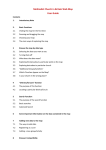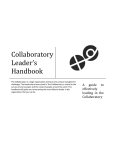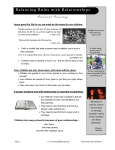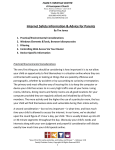Download User Guide v3.pub - The London Institute for Contemporary
Transcript
eDGuide VD maginUser for church leaders A leaders’ guide accompanying the Imagine DVD: engaging Christians in life-long, whole-life discipleship in our contemporary culture, through the local church The London Institute for Contemporary Christianity St Peter’s Vere St London W1G 0DQ (w) licc.org.uk (e) [email protected] (t) 0207 399 9555 Contents How to use this guide 3 Overview of the process as a ‘map’ 4 Four stages: Waking Up to Whole-Life Discipleship 1 Watch the film 6 2 Engage the people 7 Re-imagining the Whole-Life Disciplemaking Church 3 Change a culture 14 4 Join a movement 16 Resources 17 Website resources for download at: www.licc.org.uk/imagine/dvd/userguide Need help ... Contact the LICC Imagine Team on 0207 399 9555 or [email protected] 2 How to use the church leaders guide Churches have to realise that the core of their calling is to be disciple-making communities, whatever else they do. Graham Cray This guide accompanies a DVD that seeks to envision and engage Christians for life-long, whole-life discipleship in our contemporary culture. Its thesis was first articulated in the magazine essay ‘Imagine how we can reach the UK’, fleshed out further in the follow-on magazine, ‘Let my people grow’ and delivered for reflection and discussion in this DVD format to enable groups of Christians start to really wrestle with this key challenge to the UK church in these times. It may be helpful to understand our starting point with this guide. Firstly, we’re picturing you as someone who wants to explore what the challenge presented in this DVD might mean in your own church community. We imagine that you might be asking whether God is calling you to help make whole-life missionary discipleship central and effective in the life of your church. We also assume that we’re engaging with someone willing to accept that none of us have all the answers to this crucial challenge, someone who is willing to be on a journey and be part of creating the solution to some of the issues we face in contemporary discipleship in the UK. On the next page you’ll find the map of the four parts to a journey that we’ve been working on so far with other churches. This guide primarily covers the first two parts, and highlights a series of resources that you might be able to use to engage your church in the challenge. However, we have been working with a number of churches on the second two parts of this journey. Whilst we sketch them out here, we’ve found that the way forward is through partnership. Leaders benefit from interacting both with other churches and with the Imagine team to work out how best to develop and apply this thinking in their own situation. On page 14 of this guide you’ll find an outline of what we do and also an invitation to join us at a forum day with the Imagine Team where we will unpack these next steps in more depth and you’ll have the opportunity to reflect with us on your own situation. All the resources indicated in this guide are downloadable from the website including PowerPoint slides (www.licc.org.uk/imagine/dvd/userguide). 3 magineDVD User Guide Overview 1 Watch the film 2 Engage the people Reflect on some key questions … • • • • • Show the film ... Who will reach the UK? Where are you? How shall we live? What’s the problem? How do we change? • • • • • • Use other resources ... • • • Imagine how we can reach the UK (magazine) Let my people grow (magazine) Imagine how we can reach the UK (audio CD) • • • • • Join an Imagine Leader’s Forum to… • On changing a church culture Examine your own church culture using the questionnaire Generate ideas to start to change your culture— ‘one degree shifts’ • • • • • • Meet with other church leaders seeking to create a whole-life disciplemaking church community Gain feedback on your Survey Have input from the LICC team Explore next steps for your church Need help ... Use available resources … • • Use the film discussion guide Explore the key questions Use the PowerPoint slides Discover the issues people face Share the magazines and audio CD 4 Join a movement Focus the task … • Pass the DVD round Watch in one sitting or two or three Create debate ... 3 Change a culture • • In small groups Amongst the leadership team With friends With the whole church PowerPoint Slides How whole life is your church? Survey FTCW badges 1 degree shift stories 20 small steps ideas Contact the LICC Imagine Team on 0207 399 9555 or [email protected] 4 Waking Up to Whole-Life Discipleship This section of the guide covers stages 1 & 2 of the journey. These stages about what to look out for as you watch the film, and then how to start getting others in the church to focus on whole-life disciplemaking. 5 1 Watch the film Reflect on some key questions … • • • • • Use other resources ... Who will reach the UK? Where are you? How shall we live? What’s the problem? How do we change? • • • Imagine how we can reach the UK (magazine) Let my people grow (magazine) Imagine how we can reach the UK (audio CD) Available from LICC—0207 399 9555 or www.licc.org.uk/bookshop Incisive questions are often the means through which we make important discoveries, clarify and direct our thinking, alter our priorities and behaviour. In helping Christians to gain a fresh perspective on discipleship and on church life the following questions have often made a significant difference. They’re ones that the DVD tackles. To read around the issues further, try the resources above. It's not 'HOW can we reach the UK?' but WHO? Every contact leaves a trace ... how does God want to use us in the kingdom, not just in the church? The challenges and opportunities of our daily contexts ... In a rapidly changing, bewildering culture we need wisdom for life, wherever we are. The symptoms point to two key issues: a sacred-secular divided church culture and a methodological failure to help Christians to grow in discipleship for all of life. Are we equipped to live well for Christ in all of life? Are the 10 hours in which we might be engaged in church life helping us for the rest of life? We need to recognise the challenge as primarily one of our church culture rather than one of ‘programmes’. What are the values that will shape a whole-life disciplemaking church culture? 6 2 Engage the people Show the film ... • • • • • • Create debate ... In small groups Amongst the leadership team With friends With the whole church Pass the DVD round Watch in one sitting or two or three • • • • • Use the film discussion guide Explore the key questions Use the PowerPoint slides Discover the issues people face Share the magazines and audio CD Having watched the film yourself start to engage others. Create different contexts for viewing and discussion. The film can be watched in one, two or three sittings. There’s a discussion guide on pages 18-20 in this guide. (It’s also on the DVD and website). One way of getting people to start to understand the issues is to do the questionnaire, ‘Issues you’re facing in today’s world’, on page 21-22. It’s also a great way for a leadership team to get to know their community better. Keep coming back to the key questions. On pages 8-12 these questions are fleshed out a little more. If you’d find it helpful to use the PowerPoint slides shown for each question you can download these from our website. In case you hadn’t spotted it, there’s also a 48 slide PowerPoint set on the Imagine DVD, which has comments on the ‘notes pages’. Even more simply, get people to talk around these three questions: 1. Where do you spend most of your time in an ordinary week? 2. What do you do in that time? 3. What issues have you faced in that context in the last year? Having spent the time helping people engage with this challenge you’ll need to focus them on the nub of the problem—see page 14, ‘Change a culture’. 7 Who will reach the UK? 2 Engage the people Key question Overall in the UK around 7.5% of adults go to church once a month or more … hence 7 red dots. For the last 100 years the church has been in decline. Nevertheless 7.5% represents 4.5 million people and each one of those people meets with at least 20 or 30 people each week who don’t know Jesus. Locard’s first principle of forensics: every contact leaves a trace. For years the church has been asking the question ‘how can we reach the UK’ and there’s been a lot of creativity around evangelism and lots of new resources. But as soon as you change the question and ask— who will reach the UK the picture changes. 7.5% of a 60 million population is an awful lot of people. So often we have a picture of the church in the ghetto, up against the ropes, on the margins, in a corner. The reality is that the majority of us are out there … with scores of relationships. Everyone is an FTCW—a full time Christian worker. The primary question is not how can this person serve in the church but how does God want to use this person in the kingdom. And perhaps the dominant metaphor for Christian engagement in the world in this generation is that of yeast, or leaven in the dough. 8 How can you celebrate each person as an FTCW? What stories can be told? Who and how might they be prayed for? Could you use FTCW badges creatively? As people change jobs? (available from LICC) Where are you? 2 It’s the question God asked Adam in the Garden right at the beginning. And of course God wasn’t just asking where he was physically, but also where he was mentally, spiritually, emotionally. We can each answer that same question in lots of different ways—for our own micro worlds, or in relation to the macro forces that pressure us from life in today’s world. Britain is in a state—the social data on health, youth, crime, marriage etc. is sobering. We often feel bewildered with issues coming at us from all sides—pluralism, relativism, multiculturalism, environmentalism … And we can be very tired, working longer hours than any other EU nation. We live in slave new world. This may be a society rejecting Christianity. But people are not doing so because they have found something so much better that delivers happiness. It’s only the sheer pace and intensity of consumerist life, the anaesthetising effects of our media and technologies and our addiction to entertainment that keep us from seeing things for what they are. What we lack is a core that makes sense of everything. We need wisdom for life. Whether we are Christians or not. Can you create space to ask people the questions above? Can you help people get a handle on the main pressures from our culture on this community? (Imagine DVD is a resource; or the magazine ‘Imagine how we can reach the UK’.) Can you help people recognise the issues that others in the church face? 9 Engage the people Key question How should we live? 2 What are people in our culture looking for? A story to live in that enables them to live their whole lives with integrity: with authenticity, a sense of adventure and awe, and with agape love. They may not be looking for absolute truth but they are looking for a way and a life. Is the Gospel of Christ making a real difference in our daily lives? In a broken world do we see our mission as taking love where love is not—wherever we are? Are we leaven in our culture? Incarnations of the good news of whole life salvation? Are we briefed, trained, resourced, supported and commissioned for our mission in the world? Is the 10 hours in which we might be directly engaged with our church life making a difference in the 110 of the rest of our life each week—wherever we are and whatever we do? In relation to the issues people are facing in their lives at home, at work and in leisure, how does the life and ministries of the church make a difference? How could it make a difference? How will you know? 10 Engage the people Key question What’s the problem? 2 47% of Christians say that the teaching they receive is irrelevant to their daily life—and the weakest areas are our work lives and our home lives. Why is this? Why don’t we easily think and talk Christianly about work, or school, or sleep, or rest, or the arts, or TV and so on? A major factor is the pervasive influence of the sacred-secular divide: the idea that God is much more interested in some areas of our lives than others. ‘I spend an hour a week teaching Sunday school and they haul me up to the front of the church to pray for me. The rest of the time I’m a teacher and the church has never prayed for me. That says it all.’ Is our Christianity only focused on the square mile around the church, on weekend or evening activity? Is it essentially leisure time rather than whole life? Underneath the symptoms lie two key issues. One of theology—a partial eclipse of the gospel that limits our imagination for whole life Christianity. One of method. The church is too often focused on a convert and retain strategy. Jesus trained and released his disciples into the world. He was an apprentice-maker. How do you see the sacred-secular divide at work in your own life—priorities, prayers, conversations, thinking…? How whole life is your church? (Questionnaire available from LICC website) How is your church immersing itself in an deep understanding of God’s comprehensive salvation? 11 Engage the people Key question How do we change? 2 At heart the way forward is to focus on a new church culture, rather than primarily on new church structures or programmes. It’s a culture shift that will change the current default settings of local geographical focus and evening/weekend activity. Culture is described in different ways but always reflects values. Two key values need to be embedded in the life of a church community: ‘whole-life’ reflecting God’s intense interest in all of our lives; and the value of all being apprentices together. It’s not just about teaching or even learning, but a dynamic mix of these with a quality of relationships that intentionally seek to encourage one another to grow in faith and life and mission. Values are tangibly seen in the life of a church— what’s prayed about, sung about, talked about. What stories are invited, what’s valued and affirmed, who are hailed as heroes? Cultures change as the stories change, the questions we reflect on change, and as the fabric of the life of our churches tangibly reflects our confidence in God for all of life. How could you change, for example, your prayer diary, to reflect the whole lives of the people in your church? How would preaching and teaching change? How would your approach to mission change? 12 Engage the people Key question Re-imagining the Whole-Life Disciplemaking Church This section of the guide covers stages 3 & 4 of the journey. These stages are only sketched out in this guide. We anticipate that it might be at this stage that you’d want to get in touch with us, find out how to progress through these stages in your own context, and perhaps join us on an Imagine Forum day. 13 3 Change a culture Focus the task … • • • Use available resources … On changing a church culture Examine your own church culture using the questionnaire Generate ideas to start to change your culture— ‘one degree shifts’ • • • • • PowerPoint Slides How whole life is your church? Survey FTCW badges 1 degree shift stories 20 small steps ideas What we’ve discovered is this: it’s really helpful to give people different ways to chew over some key questions that underpin ‘Imagine’, but once people start to ‘get it’, given two key tools it’s possible to head off on this journey of shifting a church culture quite simply, cheaply and without having to make major changes to church structures. That’s not to underestimate the size of the task. But it’s an encouragement that we can start to take some small steps that start to make a difference. The DVD explores two key barriers to whole-life disciple-making: the primary theological barrier of the sacred-secular divide and the primary methodological barrier - a failure to make disciples. Now we know that to tackle this requires more than a programme or two, or a sermon or two. What is required is a shift in our whole way of relating to one another, a shift in the culture of the church. Having taken the time to understand some of the key issues around whole-life discipleship, the 20 question ‘How whole-life is your church?’ survey and the idea of ‘one degree shifts can together launch a process towards becoming a ‘whole-life disciple-making community’. 1° The survey functions as an ‘audit’ and as a ‘bridge-builder’ between the leadership team and the church. It identifies strengths and weakness, and gives people a focus for what to do next. ‘One degree shifts’ are the small, or indeed not so small, ideas for how to do things differently—one small change at a time, so that a whole church starts to grasp that God really is interested in who they are, where they are daily and what they do and as a result starts to function differently as a community. It’s by no means a comprehensive answer to the issues we face. But it’s a way forward. And it’s one that other churches are taking. Our experience with them has been that the process covered in this guide takes around 6-12 months. So our invitation to you is to join this movement to change our church cultures. The following page shows a number of questions that can be asked to begin the culture change process. 14 What do we do next in our churches? What stories could you invite? What questions might leverage change? Can you use a questionnaire to understand strengths and weaknesses? (How whole-life is your church?) Change is a series of one degree shifts in a different direction. What one degree shifts might make a difference? Can you set up a team challenge using the questionnaire and the idea of one degree shifts? Discuss findings and determine strengths and weaknesses. 15 3 Change a culture 4 Join a movement Need help ... Join an Imagine Leader’s Forum to… • • • • Meet with other church leaders seeking to create a whole-life disciplemaking church community Gain feedback on your Survey Have input from the LICC team Explore next steps for your church Contact the LICC Imagine Team on 0207 399 9555 or [email protected] In 2008 the Imagine Team will be running a series of forum days in both Manchester and London where church leaders will have the opportunity to go further in understanding how to create whole-life disciplemaking communities. These days will share some of the findings of the LICC Imagine project and provide you with tools and ideas that you might be able to use in your context. They will also provide opportunities for you to reflect on how people responded to stages 1 & 2 and your understanding of the challenges you face in your context. You will also meet with other church leaders that are currently part of the Imagine pilot programme and learn from their journeys and challenges. If you would like to join us on one of these days contact the Imagine team to register your interest. 16 Resources This section contains all the resources referred to earlier in the guide. They’re downloadable form the website—www.licc.org.uk/imagine/dvd/userguide 17 Film Discussion Guide Resources You can use these questions whether you watch the film in one sitting or in two parts. Just select the questions you would find most stimulating for your situation. Session 1 Film Part 1: Living as a Christian in today’s world 1. How much do you identify with the sense of bewilderment that Mark says many people feel about the challenges of living in the UK today? 2. How real can we be with each other about the issues we face and about the challenges of living as a Christian in today’s world? 3. In your own situation or church what evidence do you see of a sacred secular divide? 4. To what extent do you feel yourself to be an FTCW – a full time Christian worker – briefed, trained, resourced and supported to live and share the good news of Jesus in your everyday context? 5. Mark reflects on the scope of God’s interest in us shown through creation and through God’s plan in Christ to bring about a renewal of all things. How have these reflections affected your understanding of the character and purposes of God? 6. What has impacted you most from part 1 of the film, and how might you respond? Before the next session You might like to read the magazine, Imagine how we can reach the UK, available from LICC (020 7399 9555 or online www.licc.org.uk/bookshop). Or try the questionnaire Issues you’re facing in today’s world. On the DVD-ROM, and on pages 2122 in this pack. 18 Session 2 Film Part 2: The whole-life disciple-making church Resources A disciple of Jesus is someone who tries to live all their life in a Jesus way. A disciple isn’t just a missionary or a witness … a disciple is an active, intentional learner, a practitioner, a doer of the Word not just a student. A disciple is accountable to someone who knows them and helps them grow and live. A disciple is an apprentice. 1. How helpful do you find this description of a follower of Jesus? 2. To what extent are you intentionally helping each other learn to be apprentices together? 3. In what ways do the things you do in your church or group help each other grow in your ability to live all of life before God? 4. Does the story from Brookside Community Church (where they changed their church business meeting) spark any ideas about how could you affirm people in their different roles and be involved together in God’s purposes in the wider world? 5. Thinking about the story of Agnes and Alan, can you be an ‘Agnes’ to someone – spurring someone on to love and good works? Can you find an ‘Alan’ to encourage along the way? 6. What has impacted you most from part 2 of the film, and how might you respond? Before the next session You might like to read the magazine, Let My People Grow, available from LICC (020 7399 9555 or online www.licc.org.uk/bookshop). Or try the questionnaire How whole-life is your church? from the DVD-ROM or on pages 23-24 in this pack. After these two sessions you may find that you need more time together to talk about the ideas in the film and what they might mean for your group or church. And if you’ve read the magazines or completed the questionnaires you might appreciate the opportunity to discuss your findings together. Perhaps you could meet to do this using the questions in Session 3. 19 Session 3 Changing culture, changing values Resources A disciple-making church is more than a community trained to reach out in mission to people, and it’s more than a church with successful programmes. A disciple-making church is a community committed to growing in faith and life and mission. It’s a community learning to live the Gospel wherever they are, whatever they do. It’s a community learning to be apprentices together, developing purposeful, caring, persevering relationships that train, resource and support each other in all areas of our lives. 1. What have you learnt about the issues people face in your group or church? (You may want to review your thoughts from session 1 or from the ‘Issues facing Christians in today’s world’ questionnaire) 2. How whole-life is your church? (You may want to review your responses to the questionnaire ‘How whole-life is your church?’) 3. How do you approach disciple-making in your church? To what extent is it central? To what extent does it reflect the two values described in the film of being ‘whole-life embracing’ and ‘all apprenticing together’? 4. What implications might this film have for your group or church? Are there some small steps that you might be able to take towards becoming whole-life disciplemaking church? (You might want to look at the suggestions in ‘20 small steps towards wholelife apprenticeship’ available on the DVD-ROM or the website) 20 Issues in today’s world Resources 1. How helpful to you is the teaching and preaching your church usually? (tick one box only) □ Very □ Quite □ OK □ Not Very □ Not at all 2. What major issues have you faced in your day-to-day life over the past year? To what extent has the overall ministry of your church helped or prepared you to deal with these issues? Issues faced at work: How has the church helped? (tick one box only) □ Very □ Quite a bit □ OK □ Not Very □ Not at all Issues faced at home: How has the church helped? (tick one box only) □ Very □ Quite a bit □ OK □ Not Very □ Not at all Issues faced at church: How has the church helped (tick one box only) □ Very □ Quite a bit □ OK □ Not Very □ Not at all Issues faced in my personal spiritual life: How has the church helped (tick one box only) □ Very □ Quite a bit □ OK 21 □ Not Very □ Not at all 3. What questions about life and faith do you feel you particularly need answers to? 4. What are the one or two primary contexts in which you have ongoing relationships with non-Christians (e.g. work, clubs, family)? Context 1:______________________________________________________________ Context 2:______________________________________________________________ 5. To what extent is the ministry of your church equipping you to live and make a difference for Christ in the contexts you identified above? Context 1 (tick one box only) □ Very □ Quite a bit □ OK Context 2 (tick one box only) □ Very □ Quite a bit □ OK □ Not Very □ Not at all □ Not Very □ Not at all 6. What do you think would help you to be more effective for Christ in these contexts? 7. Are you: □ Male □ Female 8. What is your age group? □ Under 18 □ 18-24 □ 25-44 □ 45-59 Thank you! 22 □ 60 or over Imagine Church Survey Resources ‘How whole-life is your church?’ Answer these questions and see how whole-life your church is: Yes Our church is trying as a community to picture and pray for the people of the church in their daily activities. Our church is a safe place to have questions and doubts, and values them as an opportunity to learn and grow in faith. Our church encourages us to take our local, national and global citizenship seriously and engage in issues of justice and community action. Our church creates opportunities to tell and hear each other’s stories. Our church actively tries to help every member understand the basic teachings and skills of theChristian life. Our church encourages us to find out the key pressure points for a small number of people and to pray for them. Our church encourages us to develop hospitality in ways that allow not-yet-believers to enjoy our Christian friends. Our church is a place where creativity can flourish. Our church recognises the main questions that not-yet-Christians have about our faith and helps us learn how to handle them. Our church actively supports people who are trying to bring Kingdom values into their sphere of influence e.g. the arts, business, politics, justice system, education. Our church helps us learn how to use our contemporary culture – things such as films, work experiences, news – to learn more about what it means to follow Jesus. 23 Maybe No Yes Maybe No Our church encourages us to reflect on what we’re learning at the moment. Our church is actively trying to help us gain practical wisdom for some of life’s major challenges in our home lives such as parenting, singleness, marriage, sickness and death. Our church commissions and prays for people’s new jobs and responsibilities outside the church as well as inside. Our church provokes us to pray regularly for a not-yet-believer in the life of one of our Christian friends. When we think about Jesus’ humanity we are encouraged to seriously think about what it means to follow Him in our own situations. Our corporate ‘prayer diary’ or prayer meetings show a good balance between the needs of the local church ‘scattered’, the church ‘gathered’, and the national and global issues we face, such as consumerism and poverty. The leaders in our church model ways of helping individuals mature in faith and life. Our church reflects on why the Gospel is good news for us at work, at home, in the community, in society - today, as well as for our future destiny. Our church helps us handle the tensions of suffering as well as joy, of failure as well as success. TOTAL: How many yes’s did your church score? Anything above six would actually be pretty good. The questions might also indicate some concrete ways forward for you or for your church. Could you, for example, take the initiative to find out the pressure points for a couple of people and begin to pray about them? Could you suggest to your small group that you set aside time to work through questions that your not-yet-Christian friends have? Could you simply tell a Christian friend the name of your boss, your tutor, your favourite checkout person and ask them to pray for them? 24 Using the Imagine Church Survey Resources ‘Where are we?’ The Imagine church survey seeks to help you answer this question. The survey provides a snapshot of where the church currently is by allowing church members the opportunity to honestly feedback their impressions and perceptions about the church community. Often this kind of reflection is not done as a whole community. The survey highlights the difference between the messages a leadership may be trying to impart to their congregation and what is being ‘heard’. It therefore provides an opportunity to identify areas that are perceived to require greater attention. What the survey maps is not simply a response to the Sunday content of church attendance, but an attempt to allow people to reflect on whether they feel empowered for their discipleship in the lives as a whole. Most significantly the survey allows for discussion between the congregation and the church leadership. The results of the survey should not be kept for the consumption of the leadership alone, but presented at a church meeting. The ‘yes/no’ format may at first seem limiting or ‘business-like’, however, it is the opportunity for discussion which accompanies the process that is crucial. Filling in the Survey: We suggest that surveys are distributed at a meeting and then people are given the space to complete them at a time convenient for them. Although this may mean that not all surveys are returned, nonetheless it is important that people feel that they are able to complete the survey after giving it space & prayerful consideration. Processing responses: The survey responses are placed in the Excel spreadsheet, a blank copy can be found at www.licc.org.uk/imagine/dvd/userguide The responses to each survey are placed in a separate column (from B onwards) new columns can be inserted. Use yes = ‘y’, no = ‘n’ & maybe = ‘m’. This will automatically subdivide the responses down into charts covering four subject areas (to be found on sheet ‘Charts 1’). Ecclesiology (2, 4, 8, 17) Theology (5, 11, 12, 16, 19) Personal Development (1, 13, 14, 18, 20) Mission (3, 6, 7, 9, 10, 15) Interpreting the results: Wisdom is required in interpreting the surveys; responses that come back 100% negative are not any more accurate than those that are 100% positive and as a leader you will often know when a response is realistic or not. It is important not to just look at the negative results, but equally acknowledge the positive responses. This survey seeks to help you understand where you are, not where you are not or where you should be. Importantly, this survey is not really a catalogue 25 Resources of empirical data; rather it is a reflection of the congregation’s perceptions of where they are. Do look out for responses which are strikingly low or high. However, the correlation across the four areas is perhaps more revealing than individual responses. For example, is the ecclesiology breeding a happy, but insecure, group of people who are not confident in mission? Alternatively, is the theology preparing people to respond maturely to the situations they are facing? A Caution: The idea of doing the survey is not to create a huge ‘to-do’ list for leaders so that were the survey to be repeated all areas would be covered. Indeed, this may be a harmful response which infantilises the congregation. Rather it seeks to allow leaders and their churches to communicate well and honestly with one another as you walk forward together in the challenge of building a community which has whole-life discipleship. Outcomes: The outcome is both an awareness of strengths and weaknesses and also a context for constructive and stimulating discussions of how to build a more robust whole-life discipling culture. Used in conjunction with the concept of ‘One degree shifts’ it’s possible to generate a series of small steps that will eventually change the culture of a church. At the same time it can identify where some longer term work needs to be done. If possible, please forward a copy of the survey responses to [email protected], at LICC we are interested to keep a record of the overall picture emerging from churches. We can also provide a perspective on your responses in the light of others we’ve received. 26 Further resources Resources Details of all these resources and how to obtain them is available at www.licc.org.uk/bookshop Imagine how we can reach the UK Magazine, 2003, £3 Let My People Grow Magazine, 2005, £3 (or £5 for both magazines) 21st century disciples 4 part audio CD set, recording of a workshop and teaching day with Bishop Graham Cray, £12 Let My People Grow: making disciples who make a difference in today’s world Book of essays edited by Mark Greene & Tracy Cotterell, 2007, £7.99 Imagine how we can reach the UK CD, 2007, £3.75 27








































